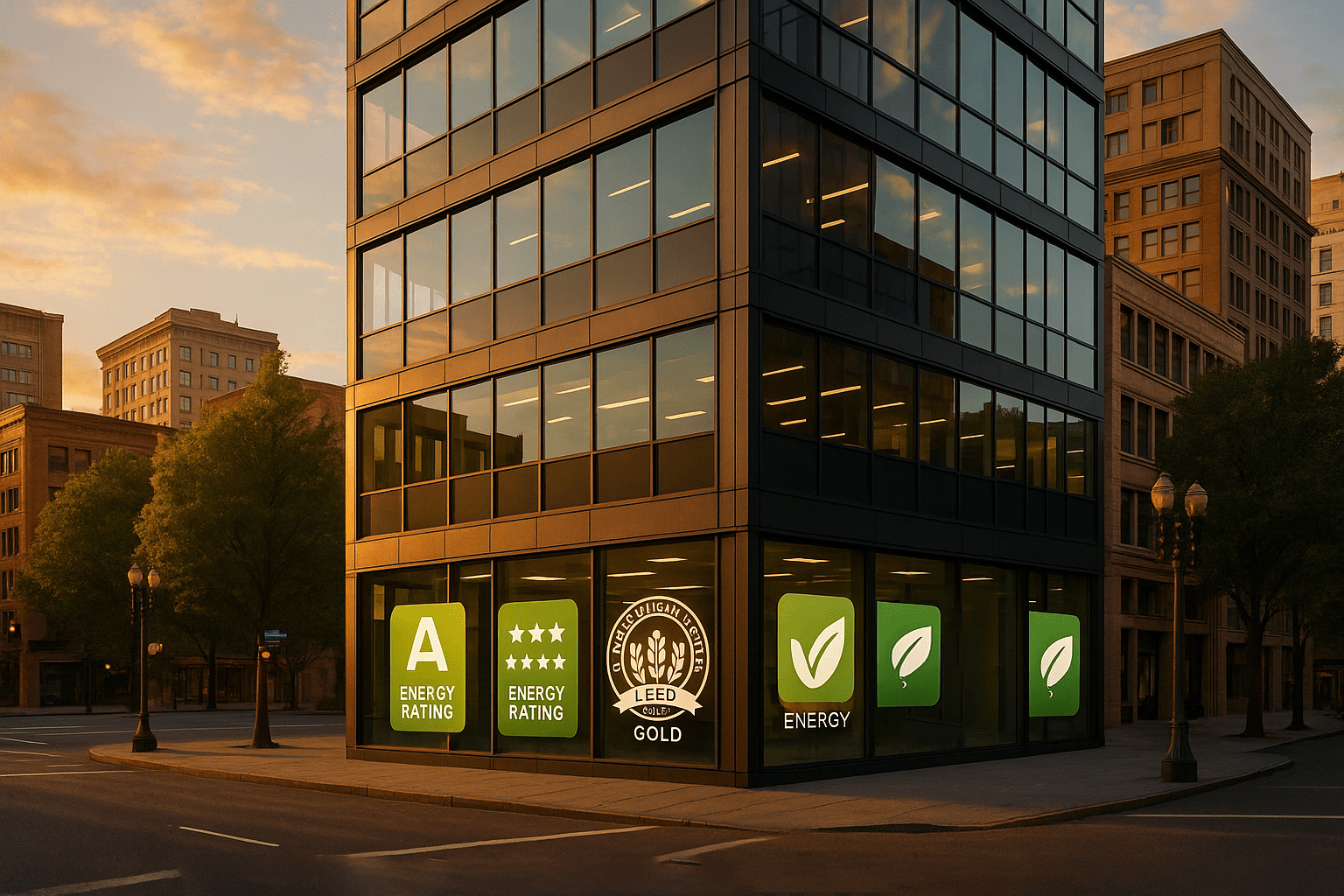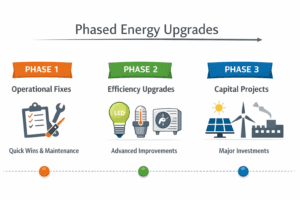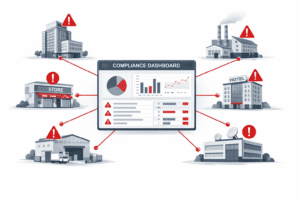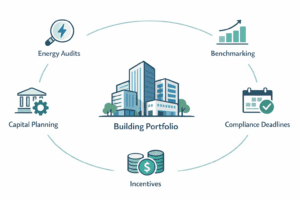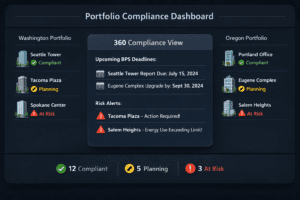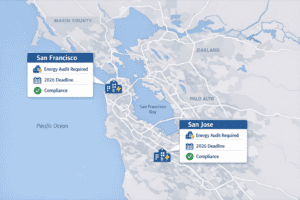If you wait until Q4 to act, you could be facing steep penalties—and a rush no consultant can save you from.
For commercial property owners and managers in Portland, the clock is ticking. Portland’s Building Performance Standard (BPS) compliance for 2025 isn’t just a bureaucratic hurdle—it’s a critical requirement tied to steep enforcement actions. With Q3 2025 quickly coming to a close, now is the time to understand Portland energy audit requirements, how to comply with Portland BPS, and the key Portland building audit deadlines for 2025. Waiting too long could put you in the middle of a last-minute scramble, just as the city’s enforcement gears up.
The Portland BPS was designed to push buildings toward higher energy efficiency, but many owners still aren’t clear on what’s required or when. From understanding Portland’s energy performance laws to meeting the building audit program deadlines, this blog will break down what you need to know—and do—before the quarter ends. Whether you’re just learning about the standard or trying to finalize your compliance strategy, this guide will walk you through the Portland BPS checklist 2025. Stay ahead of enforcement, avoid BPS penalties in Portland, and secure your energy audit consulting today—before the window closes.
What You Need to Know About Portland BPS in Q3 2025
Portland BPS Compliance 2025: The Real Deadline Is Now
Technically, Portland’s Building Performance Standard compliance is due in 2025—but in practice, Q3 is your last safe window. Why? Because audit schedules, consultant availability, and utility data processing all tighten up dramatically in Q4. Waiting until then limits your options and risks non-compliance.
Key Portland Building Audit Deadlines 2025
To avoid last-minute complications, property managers should prioritize these checkpoints:
- Utility data must be collected and verified well before submission.
- Preliminary audit reports often take 4–6 weeks to complete.
- Consultant availability drops as Q4 approaches.
- Compliance documentation should be submitted no later than early Q4 to avoid enforcement action.
If you haven’t booked your energy audit by late Q3, you’re already behind schedule.
Understanding Portland Energy Audit Requirements
Portland requires commercial properties over 20,000 square feet to meet specific performance benchmarks or undergo targeted improvements. The audits must be:
- Conducted by a qualified professional
- Inclusive of system-level analysis (HVAC, lighting, envelope, etc.)
- Supported by historical energy usage data
Missing or partial audits won’t meet the city’s threshold—precision matters.
Building Performance Standard Portland: What Counts as Compliance?
To meet Portland BPS, your building must either:
- Achieve a minimum ENERGY STAR score (typically 75+)
- Or complete prescriptive upgrades targeting inefficient systems
- Or demonstrate a custom compliance path approved by the city
Each route demands documentation and proper planning. Without a documented compliance pathway in place, enforcement notices may start landing in early 2026—and they’re not just warnings.
Prescriptive Compliance Path: Upgrade Options
If your building doesn’t qualify for the ENERGY STAR path, the prescriptive option gives you an alternative route. These upgrades focus on increasing system-level energy efficiency.
| System Category | Qualified Upgrade Examples | Compliance Notes |
| HVAC Systems | High-efficiency heat pumps, smart thermostats | Must meet minimum SEER or AFUE ratings |
| Lighting | LED retrofits, daylight sensors, occupancy sensors | Interior and exterior areas must be addressed |
| Building Envelope | Insulation upgrades, energy-efficient window replacements | Thermal performance must meet city-specified U-values |
| Water Heating | Heat pump water heaters, pipe insulation | Especially important in mixed-use and multifamily sites |
| Controls/Automation | Building energy management systems (BEMS), advanced timers | Must demonstrate measurable control over consumption |
| Plug Load Management | Smart power strips, load-sensing devices | Particularly helpful in office and tech-heavy spaces |
Important: Portland requires documented proof of these upgrades, and may verify through post-install inspections or reporting.
Avoid BPS Penalties Portland: What’s at Stake?
Penalties for non-compliance aren’t abstract—they’re financial and operational:
- Initial fines range from $500 to $5,000 per building
- Ongoing daily penalties may apply after grace periods lapse
- Public disclosure of non-compliant buildings can affect leasing and valuations
These aren’t scare tactics—they’re written into the enforcement policy.
Common Mistakes When Starting Late
Many building owners miss the mark by waiting too long. Here’s what typically goes wrong:
- Waiting for Q4 to Start
Consultant calendars fill up. Delays are common. By then, you’re scrambling.
- Incomplete Utility Data
Missing months, mixed meters, or inconsistent formats delay your audit. Correcting this with utility providers takes time.
- Underestimating Scope
Audits involve physical walkthroughs, system reviews, and operational access hard to coordinate under time pressure.
- Choosing the Wrong Compliance Path
Many assume they qualify for ENERGY STAR, only to fall short and pivot to prescriptive upgrades too late.
- Not Budgeting for Upgrades
Upgrades come with costs. Starting in Q3 gives you time to plan, seek rebates, or explore financing options.
How to Comply with Portland BPS Before Q3 Ends
If you haven’t started, here’s a condensed version of the Portland BPS Checklist 2025:
- ✅ Confirm your building’s size and coverage under BPS
- ✅ Collect 12+ months of utility data
- ✅ Hire a qualified audit consultant familiar with Portland BPS
- ✅ Review ENERGY STAR score eligibility or prescriptive upgrade options
- ✅ Submit preliminary documentation before Q4
- ✅ Plan for any upgrades or retrofits required
Pro tip: Engage an energy audit consultant early to identify the least disruptive, most cost-effective path to compliance.
FAQ: Portland BPS & 2025 Compliance

- What buildings are subject to Portland BPS in 2025?
All commercial buildings over 20,000 sq ft must comply. Mixed-use buildings may also qualify depending on usage type. - Is ENERGY STAR certification required for every building?
No. Buildings can choose between ENERGY STAR scoring, prescriptive improvements, or a custom compliance path. - How long does the energy audit process take?
Anywhere from 4 to 8 weeks, depending on complexity, access, and data availability. - Can I apply for an extension?
Extensions are limited and must be justified with evidence of effort and barriers beyond your control. - What happens if I miss the deadline?
You may face escalating fines, enforcement actions, and your building could be listed as non-compliant in public city records.
Last Chance Before the Rush: Your Q3 Wake-Up Call
If you own or manage a commercial property in Portland, Q3 isn’t just another quarter—it’s your final window to meet Portland BPS compliance for 2025 without stress, penalties, or rush fees. This post unpacked everything from key audit deadlines and prescriptive upgrades to common late-start mistakes that could cost you thousands. We also shared what counts as true compliance and how to stay off the city’s enforcement radar.
The bottom line? You can’t afford to wait. Booking your audit now gives you access to the best consultants, enough time to gather utility data, and a clear plan for upgrades if needed. Don’t risk getting stuck in the Q4 bottleneck. Stay ahead of Portland’s BPS enforcement—book your free consultation with our energy audit experts today.
VertPro.com offers tools and services to help property owners and managers improve building energy efficiency and meet regulatory standards. Whether you’re looking for instant pricing on energy audits, need support with benchmark compliance, or want to explore available building upgrade options, VertPro® provides user-friendly technology solutions to simplify the process. Their platform helps ensure adherence to over 60 Energy Benchmarking and Efficiency Laws across the country.


